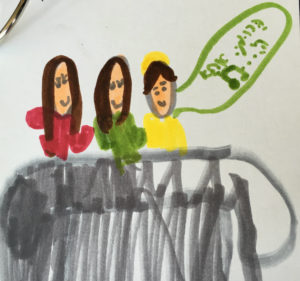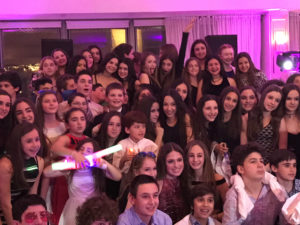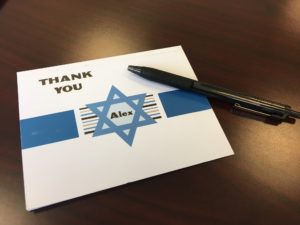by Gail Sinai, JD, LCSW, former camp parent and board member
B’nei mitzvah are such joyous days! Yet, after the big day, your child has one more thing to do—write thank you notes.
Many parents (me included) struggle to get their children to write thank you notes. And it is hard! Our children don’t know many of the guests, and the gift is so grown up, like checks or bonds. It feels easier to just type them yourself. But that is a missed opportunity. When children write their own thank you notes, they develop and strengthen healthy gratitude, an important life skill.
Gratitude it also is a significant Jewish value, seen in all the brachot (blessings). Fortunately, camp has laid the foundation for the value of gratitude during the summer in Limud and activities. So your child has the groundwork to turn the blessings learned at camp into bar mitzvah thank you notes.
You can help. Use a manageable schedule and the 3-paragraph formula, and before you know it the notes will be done and done well.
MANAGEABLE SCHEDULE
After a bar or bat mitzvah, the pile of notes looms large. Here is how your child can tackle it and feel confident.
First, you and your child need to agree to a schedule. After taking a week to recover, talk together about writing two or three notes every other day. After a week, that is 7 to 10 notes, and you will both feel the progress. That leads to more writing. Make sure your child agrees to the schedule.
Second, keep the schedule! Keep a kind eye on slips. Slips are understandable, but your child will do better making them up soon. Otherwise the project grows larger, rather than getting done. If the slips happen frequently, then something is off about the schedule. Re-negotiate a schedule everyone can keep.
Third, categorize the guests. Don’t just read names to your child. Instead, go through the guest list with your child and organize them by notes that are easy, a bit tricky and really hard. Then, ask your child what combination of notes feels best. One hard, one easy? All easy first? All hard first? That could change each day! Letting your child understand and control the flow reduces frustration so the writing is easier.
Last, only help as a parent. Your child’s job is to keep the schedule, compose the notes and hand-write the notes. Your jobs are different. Your first job is to remember and support the schedule. You are also responsible to give the information your child needs. And finally, your job is to have confidence it will get done if the child works methodically, even when your child feels, understandably, concerned or unhappy. Only do your jobs. Then the process goes smoothly and leads to the best experience for everyone.
THE NOTE: THREE PARAGRAPH FORMULA
There are three parts of a thank you note: the statement of gratitude, the connections, and the restatement, which are the elements of gratitude. This formula also recreates the formula of Jewish blessings your child learned at camp. In the thank you, as in a blessing, completing these parts lets your child feel the grateful and communicate that to the reader.
Paragraph 1: Statement of Gratitude
 The first sentence is the basic, appreciative statement in a thank you note. Like many Jewish blessings, which start “Baruch Atah Adonai,” a good thank you note starts predictably. This first sentence has three pieces.
The first sentence is the basic, appreciative statement in a thank you note. Like many Jewish blessings, which start “Baruch Atah Adonai,” a good thank you note starts predictably. This first sentence has three pieces.
First, be direct. “Thank you for the….” is clear, concise and easy to understand. Directly instruct your child to start each note this way.
Second, name the gift. Jewish blessings are specific, so the person praying focuses on and appreciates the gift, such as bread, wine or sunrises. Name even gift cards or bonds, such as “thank you for the Amazon gift card” or “thank you for the contribution to the synagogue in honor of my bar mitzvah.” The single exception is a gift of cash or checks because that gift can become anything. Cash or checks are “your gift”.
Third, find a meaningful adjective that says, as a blessing would, how the gift feels. Use questions to help your child find a meaningful adjective that is sincere and proportionate. For cash gifts, your child needs you to name the adjective based on the amount and who gave it. The usual adjective is “generous” or if large, very or extremely generous. Other adjectives that work include “surprising”, “meaningful”, “promising” “fun” or the ever-available “thoughtful” or “kind”. Your child will begin to gain a sense of the gift, and over time builds deeper gratitude.
Paragraph 2: Make Connections
This paragraph fills the thank you note with personal meaning. As the campers learned, gratitude arises from the connections between the good feeling from the gift and the one who gave them. In a thank you note, there are four elements of connection, and a thank you note needs at least three. And it is easy to do! Every child can understand it, with your help.
First, explain who the giver is. For people the child knows personally, like friends or relatives, you might not need to explain much—a child will know the reason that guest was at the event. If the child does not know the giver, like parents’ friends, explain who the person is to you and the family and why that person was invited. After your child knows why you included a guest, it is easy to write something like this—“My mom loved having her old college friend at my bar mitzvah, so thanks for showing up for all of us.” That lets your friend know how much you value the friendship. Those simple details lets your child write warmly.
Second, encourage the child to ask, why this gift?  If the gift is an object, the question is simple: why did the giver choose that gift? If the gift is cash, then the reason for the gift is more complex. Often, these gifts are praise for a job well done, fun acknowledgement of a happy day, and a commitment to the child’s future. B’nei mitzvah gifts move back and forth between family and friends as they attend each other’s simchas, building community. Every family develops a plan about how to use the cash gifts. Share with your child, and involve your child in making your family plan. Then your child will understand it and incorporate that in the note.
If the gift is an object, the question is simple: why did the giver choose that gift? If the gift is cash, then the reason for the gift is more complex. Often, these gifts are praise for a job well done, fun acknowledgement of a happy day, and a commitment to the child’s future. B’nei mitzvah gifts move back and forth between family and friends as they attend each other’s simchas, building community. Every family develops a plan about how to use the cash gifts. Share with your child, and involve your child in making your family plan. Then your child will understand it and incorporate that in the note.
Third, help the child understand what the gift means. We make a Jewish blessing at the moment it is received, like a reading of the Torah, so the meaning is clear. For a child, meaning is clearest with a specific gift. “You know I like video games, so the new XBox is perfect” will warm the heart of the giver. But cash or cash equivalents can get that effect. “I love music so I can’t wait to use my iTunes card to get some more Beyonce” tells the giver how much the gift means to your child. For large cash gifts, use the family plan to convey understanding of the gift. See the samples for an idea how to do it.
Fourth, help the child make connections between the giver and the event. Without connections, the paragraph will feel dry, like “thank you for sharing my special day.” But look just a little closer. B’nei mitzvah are full of moments in which members of the community connect, either at the service or the celebration. Help your child’s memory with questions (Did you see Uncle Barney? He was at the table across the room.) or if necessary your own memories (I saw Sarah dancing all night. Did you?) After all, remembering that great day is fun! These details let the guest know that their attendance was seen and appreciated.
Paragraph 3: Restatement
A simple, “once again thank you” completes the loop (the AMEN of the thank you note) by turning the connections in the second paragraph from personal pleasure into appreciation. This paragraph lets your child, by writing, experience and share the emotion of gratitude. Often, simple statements—“thank you once again for your thoughtfulness”—are the best, because they honestly convey what the child feels.
CONCLUDING WORD
Choose a closing word that fits the child’s relationship with the recipient. “Love” is common, but in large events can seem false or forced. A child can write  Warmly, Gratefully, Fondly, Your Friend, Happily, or even Yours Truly, and those will feel authentic if they feel true to your child.
Warmly, Gratefully, Fondly, Your Friend, Happily, or even Yours Truly, and those will feel authentic if they feel true to your child.
And that’s it! It really works. By halfway through my boys’ notes, I could hand them three names with three simple statements: name and address, description of the person and “generous” and the note happened fast. You too will find that your child will quickly learn to write notes, just as easily as the hamotzi. More importantly, your child will start to understand and appreciate what the gift is and what it means to receive, a core Jewish value. The note, when it arrives, will warm hearts, and your child will hear of it. The child has actually experienced and shared gratitude, genuinely. That lesson—the remaining Jewish lesson of b’nei mitzvah–will happily sneak up on the child later in life when needed.
SAMPLES
To a school friend
Dear Bobby:
Thank you so much for the Super Smash Bros version 30.10. I can’t wait for you to come over so I can crush you!
It meant a lot for you to be at my bar mitzvah. We go to a lot of them this year, but you really made the party so much fun, especially when you threw the French fries. So funny! I was glad you were there.
Thanks again for the game and for coming to my special day.
Your friend,
David
To a grandparent
Dear Grandma Rose and Grandpa Bert:
Thank you so much for your very generous gift. Mom put it all in my college fund.
I love seeing you cut the challah, grandpa, and both of you light the candles on my cake. And how about that picture from when we went to Disney World? I was glad to share that with everyone and remember a great family day during another great day.
Thanks again for believing in me.
Love,
Susie
To a parent’s friend
Dear Mr. and Mrs. Schumacher,
Thank you for your generous gift. We put most of it in my college fund, but I am putting 10% of my gifts to a charity (Save the Porcupines) and 5% toward buying myself a bicycle.
My dad told me how much he likes to work with you, Mr. Schumacher, and how you both have lots of nice dinners with my mom and Mrs. Schumacher. I could see that mom and dad really had a great time with you on the dance floor, so thanks for showing up for us all.
Again, thanks for your gift.
Yours truly,
Sammy
To a distant adult cousin
Dear Ida,
Thank you for your very generous bond.
Our family is big, and we don’t get to see each other often. It was cool that we all got together at my bat mitzvah. I know I was busy but having the whole family there felt so great. Maybe at my brother’s bar mitzvah we will have more time to talk. I look forward to it.
Once again, thanks so much for your gift and coming to this family day.
Fondly,
Roberta
—
Gail Sinai, JD, LCSW, has a private psychotherapy practice in New York focusing on parent therapy, support and coaching. Visit her web site, gailsinai.com, or feel free to contact her at 917-583-9358 or therapy.gail.sinai.lcsw@gmail.com to learn more.
